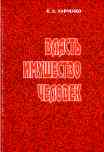
Kharchenko, Konstantin. Power-Property-Human: The Property Redistribution in bolshevik Russia
1917 - early 1921. - Russkiy Dvor, Moskow, 2000. - 264 p.

| Order! |
Everyday Life in Revolutionary Russia... - Psychological atmosphere in Revolutionary Russia...
Konstantin Kharchenko
Everyday Life in Revolutionary Russia between late 1917 and early 1921 in the mirror of official documents
Official documents written to perform their direct duties in the past have not, nevertheless, lost a value for researchers at present. Dealing with the historical records e.g. on the avalanche process of Bolshevik confiscatory measures against privately owned things, one can find in some of them the imbibed traits of everyday life. The ordinary (or, more precisely, extraordinary) situation seems to be better reflected in diaries and memoirs. Meanwhile, the relief descriptions of and reasoning about reality are to be encountered in such primarily sources as circulars, resolutions, minutes, forms for filling in, letters of complaint, and so on. This statement is unexpected at first sight, but trustworthy and, thus, needs to be examined.
One of the goals of this presentation is in specifying the amorphous term of everyday life. Since about 1930 the Soviet and partly Western researchers (e.g. Karr) have overestimated the impact of crucial situation on the cruel Bolshevik policy. In contrast, the other part of Western historians (e.g. Pipes) together with modern Russian ones has been considering extraordinary policies as the actions conceived consciously to establish a new form of social system. Therefore, studying of how the Soviet rulers represented and employed the background for urging populace to be subjected to their directions - and how citizens tried to defend themselves, taking to the very unfavorable background - this insight seems to be better than an idea of how this background shaped the policy. To begin with, the Bolshevik authorities used to represent the background through language usage. Civil servants urged people to imagine the concept of 'time' in a particular way. The survived minutes of some regional assembles contain the resolutions written loftily: "... to regulate the life according to the revolutionary time requirements". The Bolsheviks aimed to make time sacred.
The powerholders, especially local officials were frequently faced with threatening of a tough reality. Both rulers and citizens suffered, since the everyday life in revolutionary Russia had been overshadowed by arbitrary actions of troops and gangs. The power, however, used to be exceedingly strong in regard to the populace. It would not be a mistake to say that among the whole complex of the mentioned confiscatory measures the most awful were the facts attesting their ordinary character, e.g. "there are two mounted militiamen in each district... Besides, there are 6 confiscated horses more" (extracted from a report). Besides, the background was frequently saddened with epidemics. As the attracted records are revealing, this circumstance might exacerbate both the decreasing and increasing of state's coercion. On the one hand, when typhus had begun in December 1918, it was recommended from above to release a part of prisoners. On the other hand, in 1920, when cholera had descended upon the Kursk region, all unemployed doctors were mobilized in fear of punishment.
This paper will discuss in what cases the attributes of everyday life - e.g. a dirty bath, snow-drifts, taking off skins from contagious killed horses by villagers - used to be painted on a canvas of official document. Curiously, such passages were sometimes prohibited to arrear in official documents, since they did not coincide with the communist doctrine.
This essay pointed out the reality not only being designated, but also assessed. It was revealed when dealing with some survived popular utterances - e.g. "everything here is similar to a beggar realm". In part, some contexts, where the word of 'abnormity' had figured, were considered.
The ultimate question to be posed is to what degree the background should be common or specific in comparison with the other transition periods, and how it was influenced by political regime, wartime, and national identity.
This abstract was submitted for consideration to be presented on the conference ''Global Linkages: The Internationalization of Everyday Life'' that will be held in San Diego, California (October 23-27, 2002).